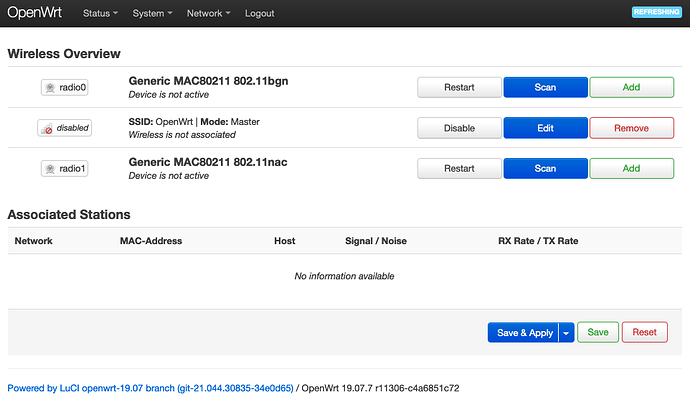With this version I was not able to establish a wireless connection, even as open network.
Extracted from system.log:
Mon Feb 15 15:34:46 2021 user.info kernel: [ 8.837775] kmodloader: loading
kernel modules from /etc/modules.d/*
Mon Feb 15 15:34:46 2021 kern.info kernel: [ 8.847015] ip6_tables: (C) 2000-2006 Netfilter Core Team
Mon Feb 15 15:34:46 2021 user.info kernel: [ 8.852171] urngd: v1.0.2 started.
Mon Feb 15 15:34:46 2021 kern.info kernel: [ 8.856951] Loading modules backported from Linux version v4.19.161-0-gdaefdc9eb24b
Mon Feb 15 15:34:46 2021 kern.info kernel: [ 8.864671] Backport generated by backports.git v4.19.161-1-0-g4bb568fe
Mon Feb 15 15:34:46 2021 kern.info kernel: [ 8.872867] ip_tables: (C) 2000-2006 Netfilter Core Team
Mon Feb 15 15:34:46 2021 kern.info kernel: [ 8.881802] nf_conntrack version 0.5.0 (8192 buckets, 32768 max)
Mon Feb 15 15:34:46 2021 kern.info kernel: [ 8.907290] xt_time: kernel timezone is -0000
Mon Feb 15 15:34:46 2021 kern.info kernel: [ 8.932505] PPP generic driver version 2.4.2
Mon Feb 15 15:34:46 2021 kern.info kernel: [ 8.937838] NET: Registered protocol family 24
Mon Feb 15 15:34:46 2021 kern.info kernel: [ 8.946607] Broadcom 43xx driver loaded [ Features: NL ]
Mon Feb 15 15:34:46 2021 kern.info kernel: [ 8.956634] usbcore: registered new interface driver brcmfmac
Mon Feb 15 15:34:46 2021 kern.warn kernel: [ 8.962563] pci_generic_config_write32: 48 callbacks suppressed
Mon Feb 15 15:34:46 2021 kern.warn kernel: [ 8.962574] pci_bus 0000:01: 1-byte config write to 0000:01:00.0 offset 0x3c may corrupt adjacent RW1C bits
Mon Feb 15 15:34:46 2021 kern.info kernel: [ 8.978310] pci 0000:00:00.0: enabling device (0140 -> 0142)
Mon Feb 15 15:34:46 2021 kern.warn kernel: [ 8.983997] pci_bus 0000:00: 2-byte config write to 0000:00:00.0 offset 0x4 may corrupt adjacent RW1C bits
Mon Feb 15 15:34:46 2021 kern.warn kernel: [ 8.993689] pci_bus 0000:00: 2-byte config write to 0000:00:00.0 offset 0x4 may corrupt adjacent RW1C bits
Mon Feb 15 15:34:46 2021 kern.info kernel: [ 9.003373] brcmfmac 0000:01:00.0: enabling device (0140 -> 0142)
Mon Feb 15 15:34:46 2021 kern.warn kernel: [ 9.009485] pci_bus 0000:01: 2-byte config write to 0000:01:00.0 offset 0x4 may corrupt adjacent RW1C bits
Mon Feb 15 15:34:46 2021 kern.warn kernel: [ 9.019173] pci_bus 0000:01: 2-byte config write to 0000:01:00.0 offset 0x4 may corrupt adjacent RW1C bits
Mon Feb 15 15:34:46 2021 kern.info kernel: [ 9.192073] brcmfmac: brcmf_fw_alloc_request: using brcm/brcmfmac4366c-pcie for chip BCM43664/4
Mon Feb 15 15:34:46 2021 kern.warn kernel: [ 9.415864] brcmfmac 0000:01:00.0: Direct firmware load for brcm/brcmfmac4366c-pcie.asus,rt-ac88u.txt failed with error -2
Mon Feb 15 15:34:46 2021 kern.warn kernel: [ 9.427032] brcmfmac 0000:01:00.0: Direct firmware load for brcm/brcmfmac4366c-pcie.txt failed with error -2
Mon Feb 15 15:34:46 2021 kern.info kernel: [ 9.764694] brcmfmac: brcmf_fw_alloc_request: using brcm/brcmfmac4366c-pcie for chip BCM43664/4
Mon Feb 15 15:34:46 2021 kern.warn kernel: [ 9.773517] brcmfmac 0000:01:00.0: Direct firmware load for brcm/brcmfmac4366c-pcie.clm_blob failed with error -2
Mon Feb 15 15:34:46 2021 kern.info kernel: [ 9.783831] brcmfmac: brcmf_c_process_clm_blob: no clm_blob available (err=-2), device may have limited channels available
Mon Feb 15 15:34:46 2021 kern.info kernel: [ 9.795088] brcmfmac: brcmf_c_preinit_dcmds: Firmware: BCM43664/4 wl0: Nov 5 2018 03:19:56 version 10.28.2 (r769115) FWID 01-d2cbb8fd
Mon Feb 15 15:34:46 2021 kern.warn kernel: [ 9.834648] pci_bus 0001:01: 1-byte config write to 0001:01:00.0 offset 0x3c may corrupt adjacent RW1C bits
Mon Feb 15 15:34:46 2021 kern.info kernel: [ 9.844456] pci 0001:00:00.0: enabling device (0140 -> 0142)
Mon Feb 15 15:34:46 2021 kern.warn kernel: [ 9.850140] pci_bus 0001:00: 2-byte config write to 0001:00:00.0 offset 0x4 may corrupt adjacent RW1C bits
Mon Feb 15 15:34:46 2021 kern.warn kernel: [ 9.859865] pci_bus 0001:00: 2-byte config write to 0001:00:00.0 offset 0x4 may corrupt adjacent RW1C bits
Mon Feb 15 15:34:46 2021 kern.info kernel: [ 9.869584] brcmfmac 0001:01:00.0: enabling device (0140 -> 0142)
Mon Feb 15 15:34:46 2021 kern.warn kernel: [ 9.875762] pci_bus 0001:01: 2-byte config write to 0001:01:00.0 offset 0x4 may corrupt adjacent RW1C bits
Mon Feb 15 15:34:46 2021 kern.warn kernel: [ 9.885516] pci_bus 0001:01: 2-byte config write to 0001:01:00.0 offset 0x4 may corrupt adjacent RW1C bits
Mon Feb 15 15:34:46 2021 kern.info kernel: [ 10.062100] brcmfmac: brcmf_fw_alloc_request: using brcm/brcmfmac4366c-pcie for chip BCM43664/4
Mon Feb 15 15:34:46 2021 kern.warn kernel: [ 10.073840] brcmfmac 0001:01:00.0: Direct firmware load for brcm/brcmfmac4366c-pcie.asus,rt-ac88u.txt failed with error -2
Mon Feb 15 15:34:46 2021 kern.warn kernel: [ 10.084985] brcmfmac 0001:01:00.0: Direct firmware load for brcm/brcmfmac4366c-pcie.txt failed with error -2
Mon Feb 15 15:34:46 2021 kern.info kernel: [ 10.424665] brcmfmac: brcmf_fw_alloc_request: using brcm/brcmfmac4366c-pcie for chip BCM43664/4
Mon Feb 15 15:34:46 2021 kern.warn kernel: [ 10.433456] brcmfmac 0001:01:00.0: Direct firmware load for brcm/brcmfmac4366c-pcie.clm_blob failed with error -2
Mon Feb 15 15:34:46 2021 kern.info kernel: [ 10.443761] brcmfmac: brcmf_c_process_clm_blob: no clm_blob available (err=-2), device may have limited channels available
Mon Feb 15 15:34:46 2021 kern.info kernel: [ 10.455006] brcmfmac: brcmf_c_preinit_dcmds: Firmware: BCM43664/4 wl0: Nov 5 2018 03:19:56 version 10.28.2 (r769115) FWID 01-d2cbb8fd
Mon Feb 15 15:34:46 2021 user.info kernel: [ 10.480820] kmodloader: done loading kernel modules from /etc/modules.d/*
So either way, the firmware load is failing.

